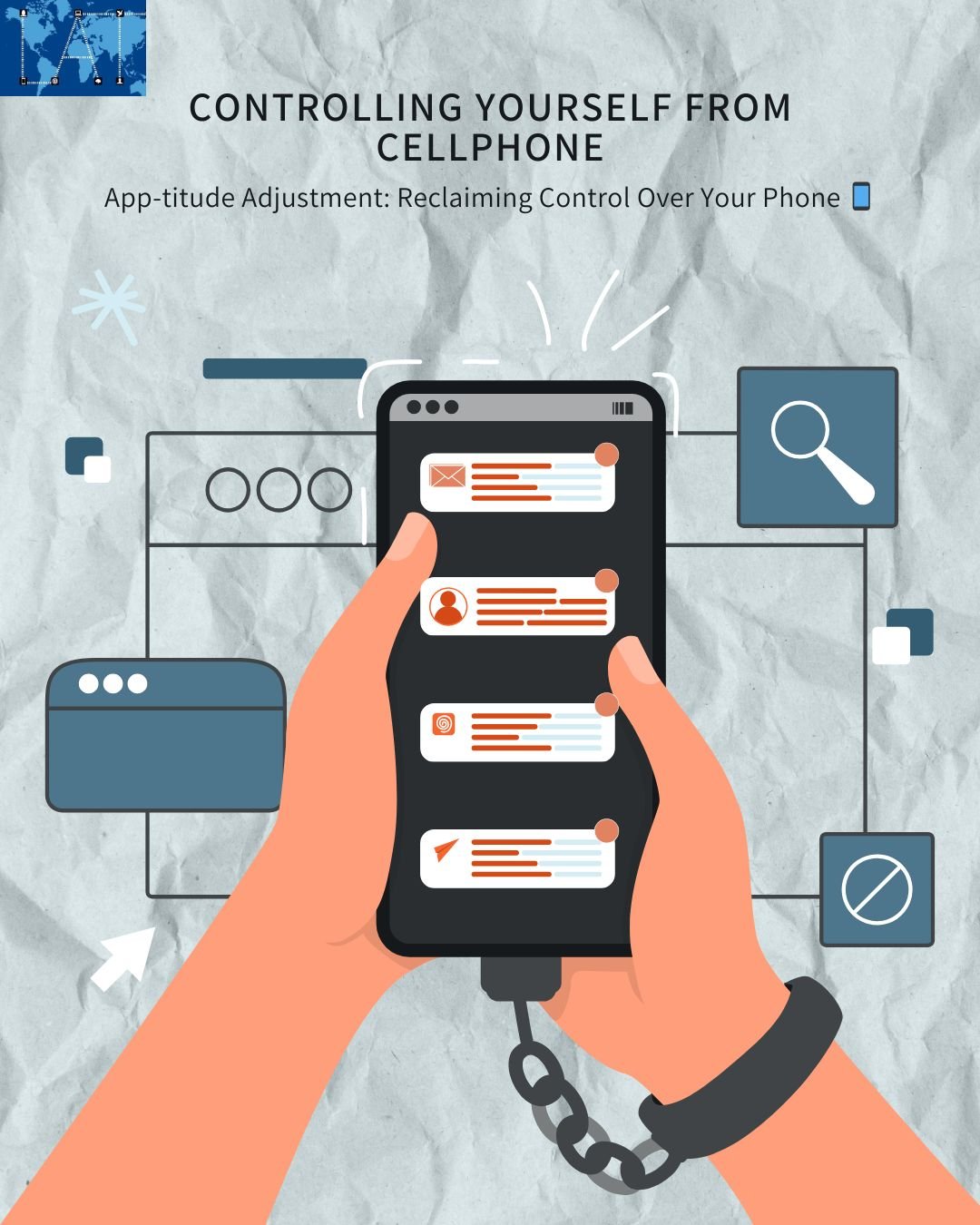In our fast-paced, modern world, cell phones have evolved from simple communication devices to indispensable accessories that serve as navigators, personal assistants, and entertainment hubs. The average person spends around 5.4 hours per day on their smartphones, showcasing their integral role in daily life. While many users can regulate their screen time, a growing concern lies in the risk of cell phone addiction, affecting individuals of all ages. In this blog post, we will explore the signs, risk factors, and consequences of cell phone addiction, along with practical tips to prevent, overcome it and Controlling yourself from cell phone.
Identifying the Risk Factors: Who is Most Vulnerable?
Every cell phone user is susceptible to developing an addiction, but certain groups face a higher risk. According to a study published in Frontiers in Psychiatry, adolescents under 20 years old are particularly vulnerable due to their likelihood of experiencing behavioral problems. Teens, often lacking in self-control skills, may struggle to manage screen time effectively. Notably, approximately 27% of smartphone owners between 11 and 14 years old never turn off their phones, even during sleep.
Apart from age, other risk factors for cell phone addiction include individuals who:
- Suffer from anxiety or depression.
- Have low self-esteem.
- Exhibit introverted tendencies in social situations.
- Lack disciplined self-control.
- Haven’t mastered impulse control.
- While adolescents are more prominently affected, problematic cell phone usage can become an issue in anyone’s daily life, especially if they possess one or more of these risk factors. Recognizing these vulnerabilities is the first step in fostering a healthy relationship with our digital devices.
Spotting the Signs: Symptoms of Cell Phone Addiction
Identifying the symptoms of cell phone addiction is crucial to addressing the issue promptly. Some common indicators include:
- Anxiety when the phone is out of reach or without service.
- Interference with daily activities and tasks.
- Negative impact on relationships and social events.
- Physical effects like neck pain or eye strain.
- Distorted sense of time due to phone distractions.
- Withdrawal from the physical world and enjoyable activities.
- Compromised professional or personal relationships.
- Failed attempts to limit phone usage.
If you recognize any of these signs in your behavior, it might be time to reevaluate your relationship with your smartphone and take necessary steps to regain control.
Understanding the Consequences: Effects of Excessive Cell Phone Usage
Excessive cell phone use can lead to various negative consequences, impacting different aspects of life. Some notable effects include:
1. Mental Health Issues:
Studies indicate that prolonged use of smartphones can contribute to anxiety and depression. Adolescents, in particular, are more prone to chronic stress and low emotional stability when addicted to their devices.
- Poor Sleep Quality:
Using phones before bedtime has been linked to restless sleep. Research conducted at Ohio State University demonstrated a correlation between excessive cell phone usage and insomnia, contributing to a reduction in both the quantity and quality of sleep.
- Increased Risk of Car Accidents:
Distracted driving, often exacerbated by smartphone addiction, poses a significant risk. According to the National Highway Traffic Safety Administration (NHTSA), distracted driving caused by handheld devices led to numerous injuries and fatalities in car accidents.
- Poor Academic Performance:
For students, excessive phone use in classrooms can hinder focus and engagement, potentially resulting in poor academic performance and disciplinary actions.
- Impaired Work Performance:
In the workplace, around 70% of employees keep their smartphones within sight. Distractions caused by phone usage can lead to poor performance and, in severe cases, job termination.
Understanding these consequences emphasizes the need to address and prevent cell phone addiction before it significantly impacts various facets of life.
Taking Control: Tips for Preventing Cell Phone Addiction
Preventing cell phone addiction involves establishing healthy boundaries and cultivating mindful habits. Here are practical tips for individuals and families:
- Establish Healthy Boundaries:
Set clear limits on cell phone usage, especially during family time and social events. Encourage children to follow these boundaries to foster healthy habits from a young age.
- Intentional Unplugging:
Designate specific hours each day to unplug from your phone. Engage in activities that don’t involve screens, fostering a deeper connection with the physical world.
- Track and Limit Data Usage:
Monitor your data usage and set limits for yourself and family members. This helps control the time spent on various apps and prevents excessive screen time.
- Remove Time-Consuming Apps:
Identify and remove apps that consume a significant portion of your time, such as games or social media. Limiting access to these distractions can contribute to a healthier relationship with your phone.
- Adjust Notification Settings:
Reduce the number of notifications you receive by adjusting your phone settings. This minimizes interruptions, allowing you to focus on real-world activities without constant digital distractions.
- Engage in Non-Phone Activities:
Explore hobbies or activities that don’t involve your phone. Whether it’s playing a musical instrument, painting, or other interests, diversifying your activities reduces reliance on digital devices.
By implementing these practical tips, individuals can regain control over their screen time, fostering a healthier balance between the digital and physical worlds.
While smartphones undoubtedly play a crucial role in our lives, it’s essential to maintain a healthy balance to avoid falling into the trap of cell phone addiction. Recognizing the signs, understanding the risks, and adopting preventative measures contribute to a more fulfilling and mindful use of our digital lifelines. By prioritising real-world engagement, individuals can ensure their mental and emotional well-being while harnessing the benefits of modern technology. Strike the right balance, and let your smartphone enhance, not detract, from your overall happiness and fulfilment.
Cell phone addiction is a growing concern that requires collective efforts to address effectively. Living Around Technology, with its commitment to socio-cybersecurity and community welfare, extends its mission to tackle this issue head-on. By raising awareness, collaborating with stakeholders, and providing practical tips, LAT aims to empower individuals, especially teenagers and young adults, to maintain a healthy balance between their digital and real-world experiences. As we navigate the digital landscape, let’s prioritise the well-being of our community by fostering responsible and mindful cell phone usage. Through education, awareness, and collaboration, we can build a healthier relationship with technology, ensuring that it enhances our lives without overshadowing the richness of our offline experiences.

FAQs
Q: Can anyone develop cell phone addiction?
Yes, while teenagers are more susceptible, individuals of any age with certain risk factors are at risk of developing cell phone addiction.
Q: What are the signs that indicate someone may be addicted to their cell phone?
Signs include anxiety when the phone is unavailable, interference with daily activities, negative impacts on relationships, physical effects, distorted sense of time, withdrawal from the physical world, and unsuccessful attempts to limit usage.
Q: How does cell phone addiction impact mental health?
Excessive cell phone use has been linked to anxiety and depression, especially in adolescents who may experience chronic stress and low emotional stability.
Q: Can cell phone addiction affect academic and work performance?
Yes, students using phones in class may have difficulty focusing, leading to poor academic performance. Similarly, distracted employees may experience consequences such as poor job performance or termination.
Q: What steps can individuals take to prevent cell phone addiction?
Establishing healthy boundaries, intentional unplugging, tracking and limiting data usage, removing time-consuming apps, minimizing notifications, and engaging in offline hobbies are effective strategies to prevent cell phone addiction.
By being mindful of the potential risks, implementing preventative measures, and striking a balance between the digital and real world, individuals can maintain a healthy relationship with their smartphones and enjoy the benefits of technology without succumbing to addiction.
Q: What factors help in controlling yourself from cell phone?
Controlling oneself from excessive cell phone use involves a combination of self-awareness, establishing boundaries, and implementing practical strategies. Developing mindfulness about the negative impacts of excessive screen time on mental and physical well-being is a crucial first step. Setting clear boundaries, such as designated periods for phone use or creating phone-free zones, helps create a structured approach to usage. Utilising productivity apps that limit screen time or scheduling regular breaks can also aid in maintaining control.
